
8 minute read
Leaving No Trace in the Loxahatchee Landscape
by Jenna Taylor, Central/South Trail Program Manager
One of the first concerns the trail crew leaders hear when talking to a prospective new volunteer, “Oh, I’m probably not strong enough to do that type of work,” or “I want to help, but I don’t know how to do trail maintenance.” While it is true that some of the work on the Florida National Scenic Trail (Florida Trail) takes a specialized set of skills or certifications to, say, remove a downed tree with a chainsaw, there are definitely tasks along the trail that everyone can do. One of those incredibly important tasks is good old fashioned litter cleanup. Our partners at the University of Florida estimated that the Florida Trail saw 375,00 visitors last year. Imagine if each one of those visitors unintentionally dropped even one piece of trash. Add to that, trash that washes down the Kissimmee and Suwannee Rivers, floats down from helium balloon releases, or is tossed out of windows and the trail starts looking well, pretty trashy. The Loxahatchee Chapter of the Florida Trail Association (FTA) saw the hesitation to jump in with both feet into trail maintenance by potential volunteers as an opportunity, and in 2021, they launched a new initiative called Trail Keepers. Trail Keepers focuses on the Ocean to Lake (OTL) trail which runs from Hobe Sound Beach Park to Lake Okeechobee. This 61.4 mile trail is a popular destination for hikers who are new to Florida hiking and want to experience it in a smaller dose rather than, or before, tackling the entire Florida Trail. It is also a favorite among seasoned Florida hikers who come back year after year to complete this section. Through the Trail Keepers program, volunteers, new and seasoned, are provided with a reusable dry bag branded with the Trail Ocean to Lake Trail Marker
Advertisement
Keepers program logo. Once a month, this crew of volunteers strictly focuses on removing litter and debris from the landscape along the OTL. The Loxahatchee chapter’s Trail Keepers program was created by Hannah Campbell, a long time supporter of the FTA. When she began as an activity leader with the chapter, she started out by leading backpacking trips and classes. “Out of this subgroup, we were trying to come up with new ideas to
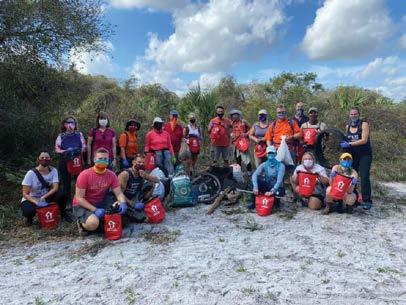
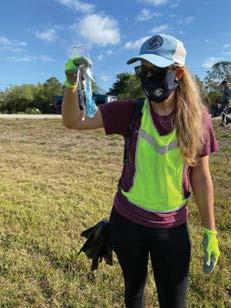
A volunteer along mile 35 collects discarded masks The inaugural group of Trail Keepers in February, 2020
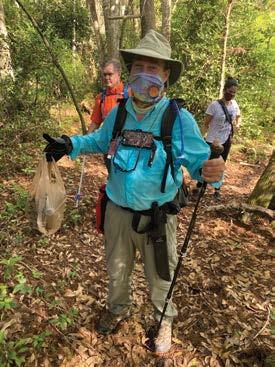
recruit new volunteers. I suggested environmental stewardship and the idea took off from there,” Hannah said. As a rule, Hannah always kept a dry bag for trash on her pack and said it was a joke among her hiking community that hiking with her was a slow process because she was always stopping for trash. “Once you start to see it, it is hard to not see it everywhere,” she said. When she is not a volunteer for the FTA, Hannah serves as the Director of Education for the Loggerhead Marine Center in Juno Beach. They had used a similar activity focused on marine debris to engage and recruit volunteers and she wanted to see if they could replicate the activity along hiking trails. With the support of an anonymous donor who purchased the first 100 dry bags, they held their inaugural event on Valentines Day 2021. This event took place near the I-95 and Turnpike exchange, miles 46-48 of the OTL-- a section that was definitely in need of the Trail Keepers. The 24 volunteers in attendance collected over 30 bags of trash for removal. In March they tackled miles 35 and 36 and 12 volunteers helped haul out hundreds of pounds of trash. The group found everything from the expected, diapers, tires etc. to the bizarre, underwear and several bottles of urine. Most commonly though, they found single use items such as plastic forks, water bottles and personal protective equipment (find alternatives to these single use items at the Florida Trail or Loggerhead Marine Center online stores!). Don’t worry, all volunteers were provided with gloves!
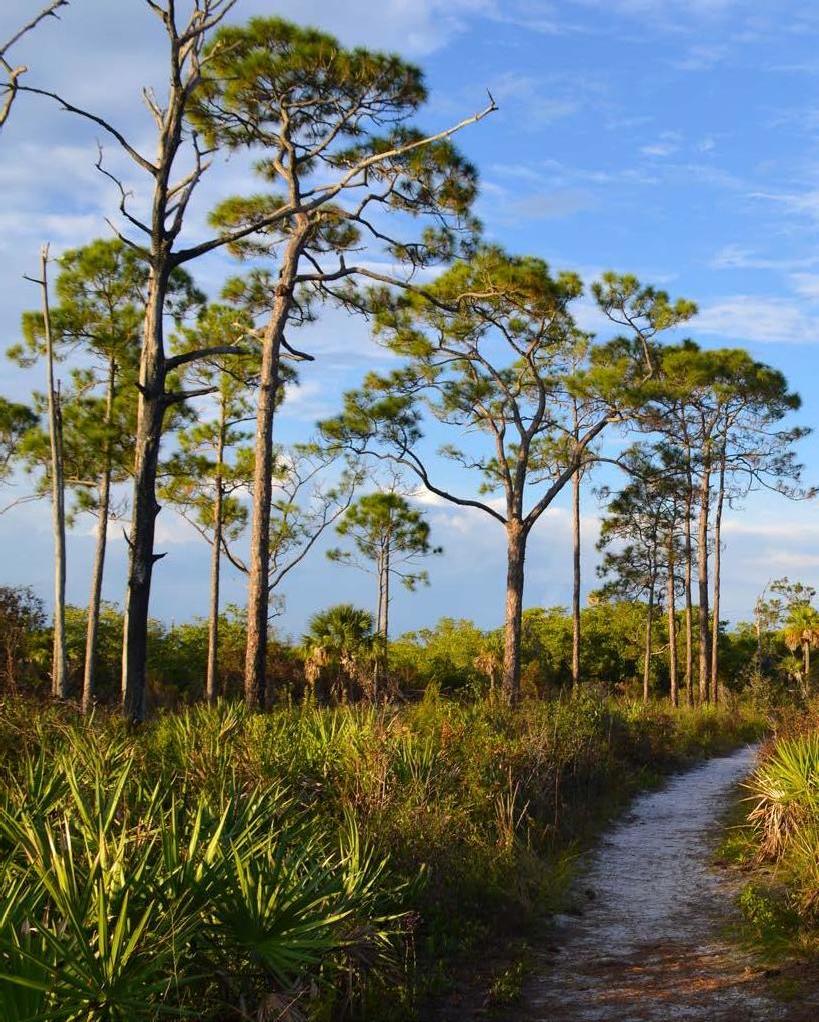
Litter costs the United States $11.5 billion annually according to Keep America Beautiful, an organization that focuses on litter removal and research. This impacts everything from taxes to housing costs in a community. Litter on our trails can pollute our waters, harm wildlife and reduce the beauty of our public lands. “ We get outside because we want to escape the hustle and bustle of urban living. To see unwanted remnants of our environmental impact in natural spaces is something no one wants,” says Hannah. “My previous experience was that people found their niche with FTA. I found that in the Trail Keepers program we had everybody from every different sector of the FTA, in addition to new volunteers. Whatever their preference for trail use was, they had Scott Lunsford, Loxhatachee Chapter Member, cleans trail at a Trail Keepers event
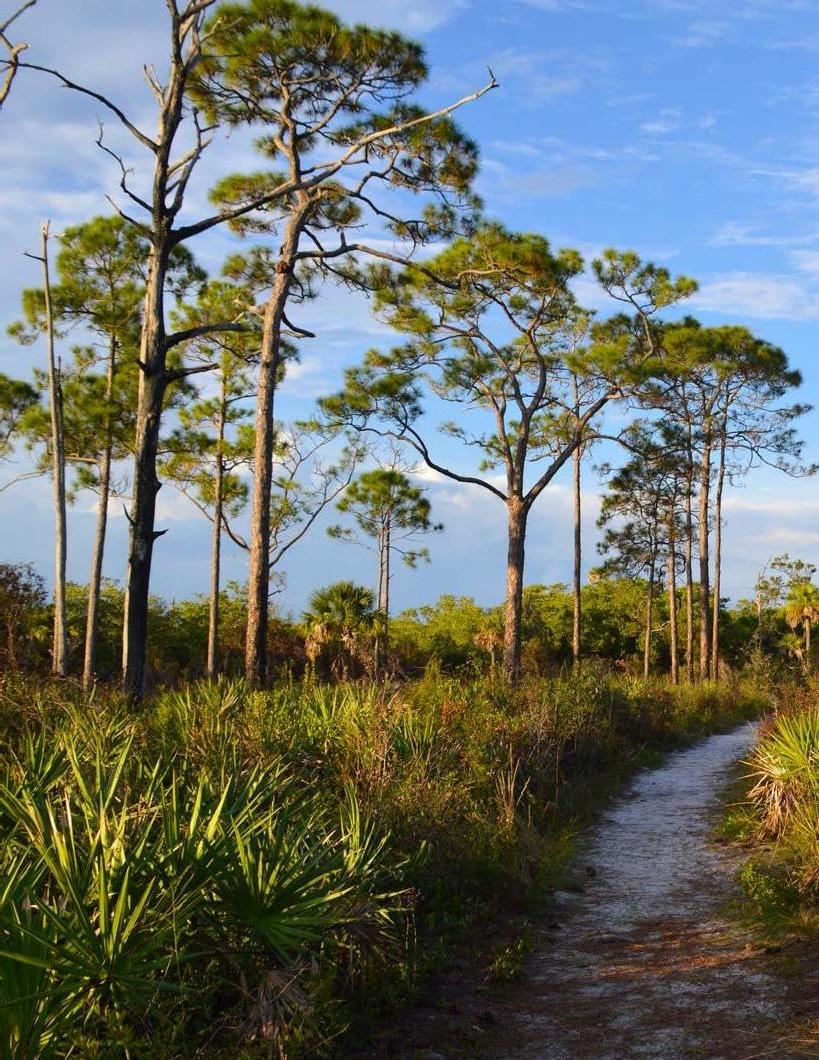
a common interest in keeping it clean,” said Hannah. She believes this is just the beginning for the Trail Keepers program and hopes to see it grow and replicate throughout the Florida Trail Association chapters. Anyone interested in starting their own branch of Trail Keepers can reach out to Hannah at hcampbell@marinelife.org.
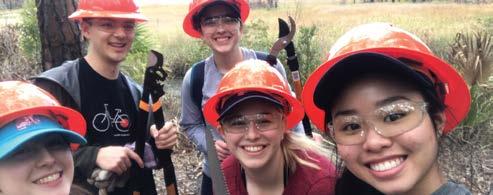
In 2020, the Partnership for National Scenic Trails and the Florida Trail Association released guiding principles on diversity and inclusion in the outdoors. One of those statements by the FTA was to “Identify barriers to becoming involved in our organization or hiking our network of trails and reduce those barriers to the greatest extent possible.” We cannot do this work without partners like the Loggerhead Marine Center and our other affinity partners such as OutdoorAfro, LatinX Hikers and others. We asked Hannah to share how the Florida Trail network is impacting the barriers in education throughout South Florida.
Hikers Keep Kids Connected to Nature in the New Education Landscape As we surpass a full year since COVID-19 changed the ‘normal’ as we knew it, I find myself imagining the twists, turns, ups and downs of the last year as a freshly blazed trail behind me. I reflect on how fortunate I have been to have the resources, knowledge and lived experience to have avoided major hotspots on my feet or leaky pack covers along my journey. I’m grateful to have had access to tools and strategies that helped me continually put the next foot forward, especially a positive relationship with the outdoors. For as long as I can remember, nature has been a source of play, fun, adventure and respite during hard times. But, does everyone know nature like I do? Unfortunately, there are many for whom finding refuge, solace and healing in nature was not, and has never been, an option. In today’s new education landscape, connecting kids to nature has never been more important… or more difficult.
The State of the Landscape When schools closed in March of 2020, the way in which teachers engage children in learning changed drastically. Kids no longer learned in groups with their peers or in the classrooms they once knew; Zoom and Google Classroom became their new, virtual learning portal and anticipated field trips to parks and natural areas were cancelled. Although the outdoors may have provided a safer and more spacious environment in which to learn than a traditional classroom while still offering critical social-emotional connection, many barriers such as transportation and safe shelter made virtual learning the only viable option. This left many educators and environmental leaders concerned about the disconnect of kids from nature—and from each other —in an already increasingly disconnected climate. Research shows that time spent in nature provides us with physical and psychological benefits as well as dramatically increases the likelihood of future environmental conservation action. If you ask a hiker what inspired them to fall in love with nature, chances are you’ll hear something about an experience in the outdoors and not about an excerpt from a textbook. So, how could environmental educators continue to expose children to the wonders and benefits of nature during this isolated time in their learning journey while still keeping them safe? It turns out, we found the answer in a group of passionate, determined hikers who had a little help from Loggerhead Marinelife Center and the Loxahatchee Chapter of the Florida Trail Association (FTA).
Blazing Opportunities Through Hike2O: A Backcountry Benefit Event In March 2021, forty-eight hikers from across Florida answered Loggerhead Marinelife Center’s (LMC) call to help raise funds to support free, outdoor environmental education for kids and their families during the 2nd annual Hike2O event. Hiking 32-miles on the Ocean to Lake Hiking Trail that traverses through seven iconic South Florida ecosystems, hikers from as far as Homestead and Jacksonville hit the trail to raise awareness about the current nature-deficit and raised funds to expose 3,000+ kids to experiences in nature with LMC’s teaching scientists who turn nature into a classroom. We found out that hiking just feels better when you’re blazing the trail for others to follow in your path. Hikers also saw much of Florida’s native wildlife (including river otters and bald eagles), learned essential (and downright awesome) backcountry camping skills from FTA Activity Leaders, laughed too hard and built a community with LMC Trail Guides along the way.
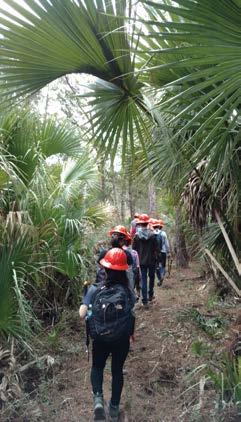
Get Involved As the education landscape continues to change, there is one thing we all know for sure: people protect what they love. We are in search of Activity Leaders around the state who are interested in hosting a Hike2O day-hike in their local area to give new and experienced hikers to give others an opportunity to fall in love with nature. If you or your local FTA chapter are interested in hosting a Hike2O event in 2022, please contact Hannah Campbell at hcampbell@marinelife.org. You can also start training to join us on the Ocean to Lake Hiking Trail for the 3rd Annual Hike2O event happening March 4 – 6, 2022.
About the author: Hannah Campbell is the Director of Education at Loggerhead Marinelife Center, a nonprofit organization dedicated to the conservation of ocean ecosystems. She is passionate about keeping kids and their families connected with our blue planet and serves as an Activity Leader for the Loxahatchee Chapter of the Florida Trail Association.








